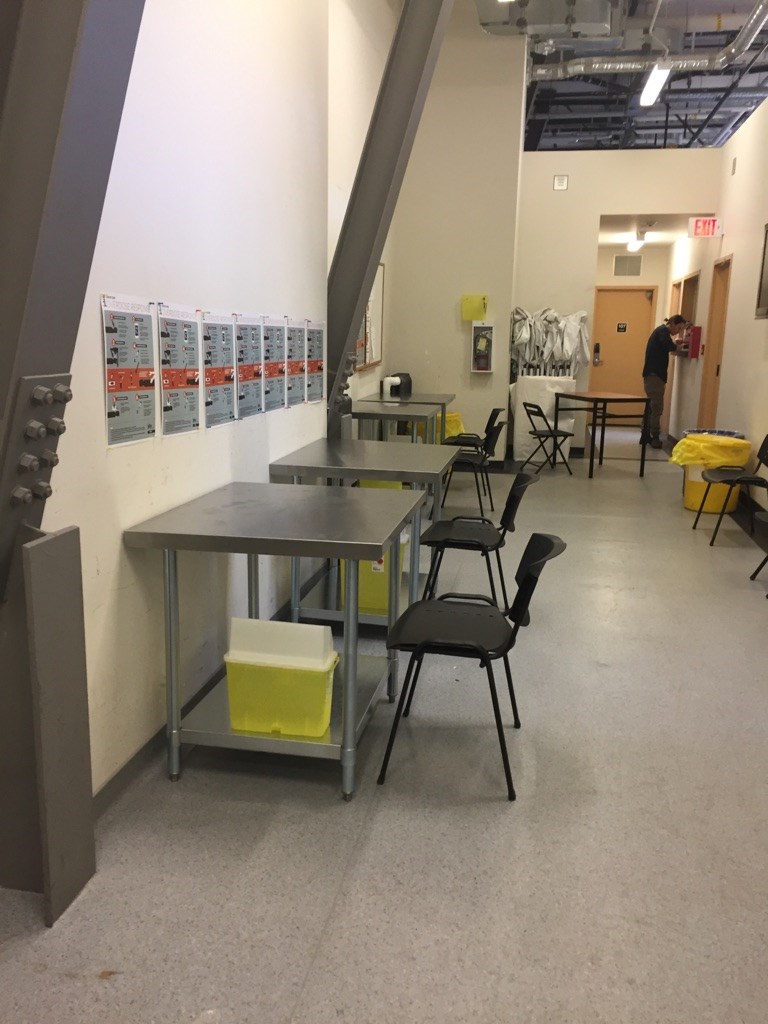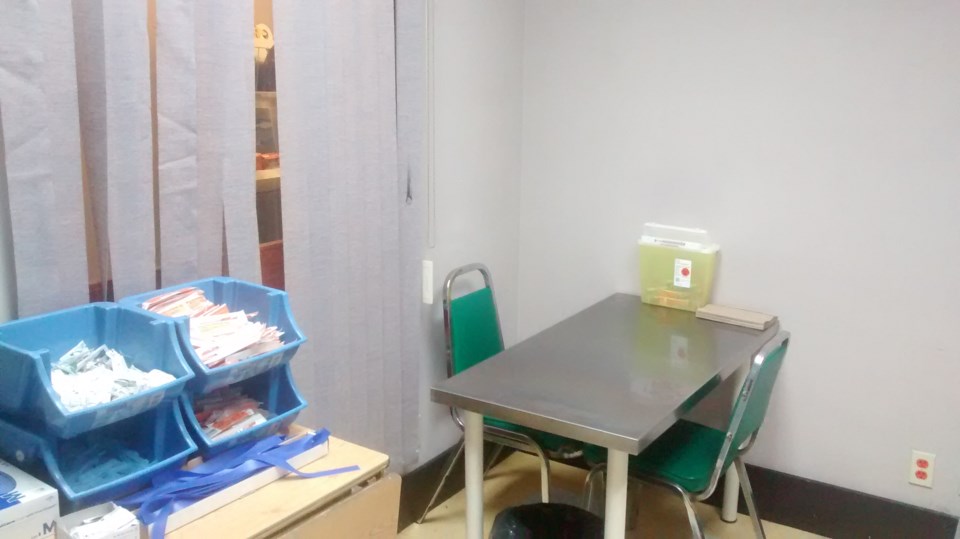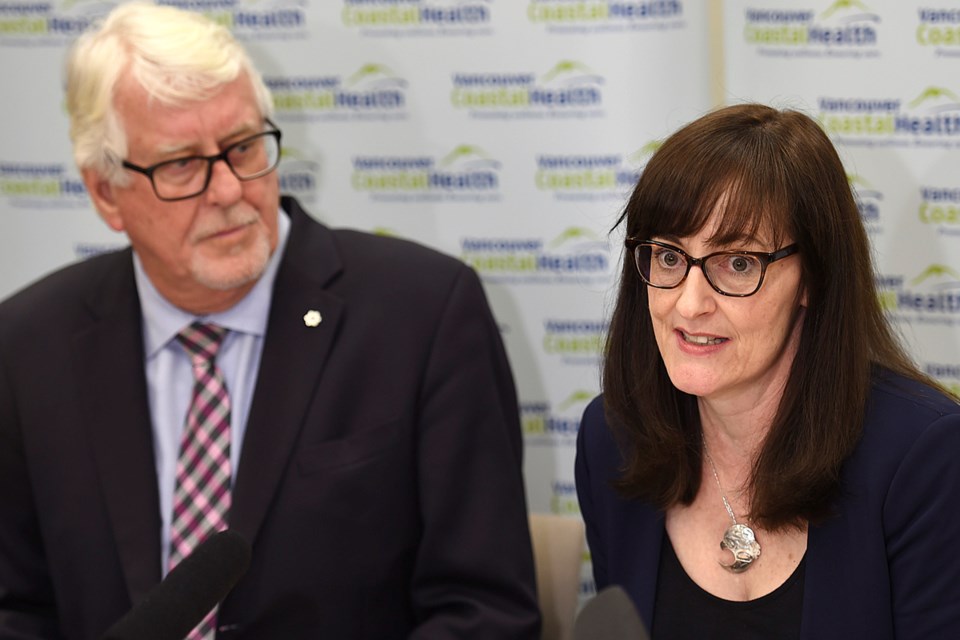The provincial government is now allowing drug injection rooms to be set up at multiple locations in Vancouver, Surrey and Victoria to combat the worsening overdose drug crisis.
The move from the government to open what they are calling "overdose prevention sites" is being done without an exemption that is needed under Canadian law to legally operate supervised injection sites in this country.
Both the Insite injection site on East Hastings and the facility at the Dr. Peter Centre in the West End — the only legal injection sites in Canada — have exemptions under the Controlled Drugs and Substances Act to operate.
But B.C. provincial health officer Dr. Perry Kendall and his counterpart in Vancouver, Dr. Patricia Daly, said the new sites are not contravening drug laws and simply bringing indoors a desperate situation already occurring in alleyways: people overdosing at an alarming rate, largely due to the potent synthetic narcotic fentanyl, are being revived by volunteers trained in how to administer life-saving naloxone until paramedics and firefighters arrive on scene.
"This is an emergency measure to try and better connect the people who can deliver naloxone — whether they're medical staff, whether they're housing staff, whether they're volunteers — with the places where people will be injecting," Kendall told reporters Thursday at a news conference in Vancouver.
Federal Health Minister Jane Philpott was not available for comment Friday but her press secretary said in an email that "given that this is new and there are many moving pieces to the opioid crisis, right now I would emphasize that the minister recognizes that B.C. is facing an extraordinary situation and that the provincial government clearly feels it needs to take extraordinary measures."
Sites opened Thursday at the Vancouver Area Network of Drug Users office, the Portland Hotel Society Washington Needle Depot and the Drug Users Resource Centre. Several more are planned for Vancouver. Surrey and Victoria will open sites within the next two weeks.

Without the sites, Kendall and Daly said, the worry is that cool temperatures hitting Vancouver will force drug users to inject alone in places such as low-income hotels, where they would not be visible to naloxone-carrying volunteers patrolling alleyways.
"It's really about saving lives," said Daly, noting a mobile medical unit will also be set up in the Downtown Eastside to cater to the unprecedented number of overdose victims showing up at hospitals.
From January to November, a total of 6,016 illicit or unknown drug overdoses were recorded at Vancouver Coastal Health emergency departments. More than one quarter — 1,679 — were opiod related and 85 per cent of them were handled at Vancouver hospitals, with 72 per cent going to St. Paul's Hospital.
The B.C. Coroners Service has said 622 people in B.C. died of an overdose between January and October, with 124 deaths recorded in Vancouver. Kendall said updated statistics will be released next week and will reveal another increase in deaths.
The Courier visited the VANDU office Thursday but staff declined to provide a tour of its two injection rooms, citing privacy concerns of drug users using the service.
Hugh Lampkin, the organization's former president and current board of director, said the rooms are equipped with clean injection supplies and monitored by staff and volunteers. A nurse from Vancouver Coastal Health was present during the Courier's visit to check in with staff in the injection rooms.
Lampkin said the rooms will accommodate 16 drug users and operate from 10 a.m. to 10 p.m., seven days a week. Users of the site who want treatment or need medical attention will be referred to Insite, which has nurses and detox facilities.
Lampkin said he welcomed the provincial government's move to fund the sites but questioned why it took so long to act on a crisis that is only getting worse.
"I don't want to get into the politics of it, but it's people lives we're talking about here," he said in the lobby of VANDU's office. "A life is a life, regardless of where people come from."

Repeated requests from reporters to Kendall and Daly to provide a specific budget for the new measures was not provided, although Kendall said all initiatives by government over the last year directed at the drug overdose crisis totals roughly $43 million.
All through the crisis, health officers, politicians and harm reduction advocates have called on the federal government to repeal a law created by the previous Harper government that creates barriers to opening more injection sites in Vancouver and across the country.
Philpott said in a recent visit to the Downtown Eastside that her government is working to introduce legislation that will make changes to the Respect for Communities Act, which health officials and harm reduction advocates say sets out an onerous list of criteria that makes opening another injection site in Canada very difficult, if not impossible.
The Act states than an applicant must provide information outlining the views of the police, municipal leaders, public health officials and provincial health ministers.
An applicant is required to provide documentation that shows the site's expected impact on crime rates, treatment options for drug users, the public health reason for needing such a site and evidence there are resources to sustain the site's operations. Philpott has said evidence has proven supervised injection sites should be a part of the government's approach to drug control.
Daly reminded reporters that Vancouver Coastal Health has applied for two injection sites under the current bill but has not heard by back from the federal government. Creating more treatment for drug users is also a priority for the health agency, she said.
"What we really want to ramp up is substitution therapy for people suffering from opioid addiction," she said, noting addiction doctors will be on staff at the new mobile medical unit that opens next week in the Downtown Eastside. "We want to put them on a subscribed substance to get them off illicit drugs."
Added Daly: "We hope that if we can really ramp up addictions treatment, that we won't see the need for all these services going forward in the future. But that remains to be seen."
City council, meanwhile, will vote Dec. 13 on whether to approve a .5 per cent property tax hike to raise $3.5 million to implement measures, including hiring new firefighters, to combat the overdose drug crisis.
mhowell@vancourier.com
@Howellings



